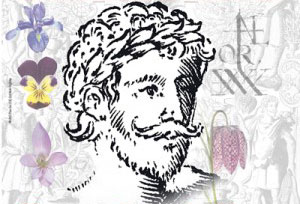News of the Week: The Real Shakespeare, Real Reporters, and the Real Thing
Is This What Shakespeare Really Looked Like?

The biggest mystery about William Shakespeare used to be the theory that it was actually Sir Francis Bacon that wrote the plays the Bard is famous for. Now there’s another controversy: Has the real face of Shakespeare finally been found?
Honestly, I didn’t even know that this was a mystery. I always thought we knew what Shakespeare looked like. Of course, I’m basing this on years and years of TV shows and movies, but I had no reason to think that it wasn’t accurate. But now botanist and historian Mark Griffiths says in Country Life that the image found in a 17th-century book on botany is the “first and only known demonstrably accurate portrait” of Shakespeare.
Of course, a lot of other historians aren’t convinced. Not only is this not the first time someone has claimed to find the “real” image of Shakespeare, this image was found in a book on botany, and some people don’t know why he would have been in such a book.
Can a Machine Replace a Reporter?

One day, everything you read online and maybe even offline (if there is such a thing as offline in the future) will be written by a computer program. Well, okay, maybe not, but it’s not like news organizations aren’t trying.
There are companies creating programs and apps that actually write some of the news stories you read on Yahoo! and the Associated Press. A reporter for NPR, Scott Horsley, decided to challenge one of these programs — with the friendly, innocuous name WordSmith — to see who could write the story quicker and if anyone could tell the difference. Here are the results.
I find this a scary development. Not just the fact that real reporters could see their jobs taken away some day, but also the fact that people think the style and personality of a writer can be duplicated 100 percent. I guess it’s the speed and information they see as the important thing, and it’s only being used for certain stories right now. If this does happen, in 50 years we’ll just be a race of people that consumes news but doesn’t write any of it.
Of course, you have no idea if this very column is being written by … BUFFERING BUFFERING … a computer program. There’s really no way you can tell 01010101010101010101010101010 is there?
The ‘Mad Men’ Finale Explained
It has become commonplace to announce in a review or essay about a TV show that there are spoilers about to be revealed. I’ve never understood that, because if I’m reading a review of a TV show I’m just going to assume that, you know, what’s in the TV show is going to be revealed. Having said that, SPOILERS FOLLOW SO RUN FOR YOUR LIVES IF YOU HAVEN’T SEEN THE MAD MEN FINALE YET.
At the end of the episode, we see Don Draper, who has left everything and everyone behind, meditating on top of a hill in Northern California with several other people in an Esalen-ish retreat. Don has his legs crossed and is in the middle of an “oooooooooommmmm” chant when the camera comes in on his face and he smiles knowingly. We hear a “ding” and immediately the classic “Hilltop” Coca-Cola commercial comes on the screen. End of show.
I think it’s pretty clear what happens: Don gets the idea for the commercial, realizes who he is, and goes back to New York City and creates the ad for McCann Erickson. It’s a positive, non-cynical ending. But so many people online, both critics and casual fans, are seeing the ending as not only cynical and defeatist but also ambiguous. You mean Don learned nothing and goes back to advertising? Does Don create the ad or is it Peggy? Does Don stay at the retreat and change his life again? Is the ad just thrown on the screen because it was released around this same time and involved a hillside full of people and has nothing to do with Don?
Honestly, I think the ending we see is the ending we got. Shows like Lost have changed the way we watch television and what we expect from a series finale, and not for the better. There’s not always a “mystery” to what we see. We have to judge the ending by the information we’re given. It’s almost as if fans and critics are writing some sort of Mad Men fan fiction to “explain” the ending, envisioning what the scene really means and what happens 30 minutes, 30 hours, 30 days after Don smiles. Sure, a lot of things could have happened, but how are we to know? We have to judge it by what happened in the episode (and in the other episodes this season).
For the record, Mad Men star Jon Hamm agrees with me.
And creator/writer Matthew Weiner clarified the ending in a talk with writer A.M. Homes at the New York Public Library on Wednesday night, saying he’s “not for ambiguity for ambiguity’s sake” and (talking about Don and the Coke ad) “the idea that someone in an enlightened state and not just co-option might have created something that is very pure.”
‘Steve Jobs’ Teaser Trailer
Another highlight of the Mad Men finale was the debut of the first trailer for Steve Jobs, the biopic of the Apple Computer guru directed by Danny Boyle and written by Aaron Sorkin (The West Wing, The Social Network). Interesting that for the trailer they’re showing latter-day Jobs with the lighter hair and not younger Jobs:
National Wine Day

I’m a red wine guy. The few times I’ve had white I’ve regretted it and I’ve run back to my Cabernet Sauvignons. But for this Monday, National Wine Day, I’ve decided I’m going to try to get into white wine. I want something light, something smooth, something that won’t scare me off, something very drinkable. Any suggestions?
And by the way, don’t confuse National Wine Day with National Drink Wine Day, which is February 18. I don’t know what the difference is (is there something else you can do with wine besides drink it?), but there you go.
Upcoming Anniversaries and Events
The Indianapolis 500 (May 24)
This is the 99th race held at the Indianapolis Motor Speedway.
First Major League Baseball night game (May 24, 1935)
There were baseball games played at night before 1935, but this was the first official Major League Baseball game played under the lights.
Brooklyn Bridge opens (May 24, 1883)
Today is the 131st anniversary of the opening of the iconic New York bridge.
Bram Stoker’s Dracula published (May 26, 1897)
You can read the classic horror novel online for free at Project Gutenberg.
Golden Gate Bridge opens (May 27, 1937)
The official site has a complete history of the bridge and information if you’re thinking making a visit.